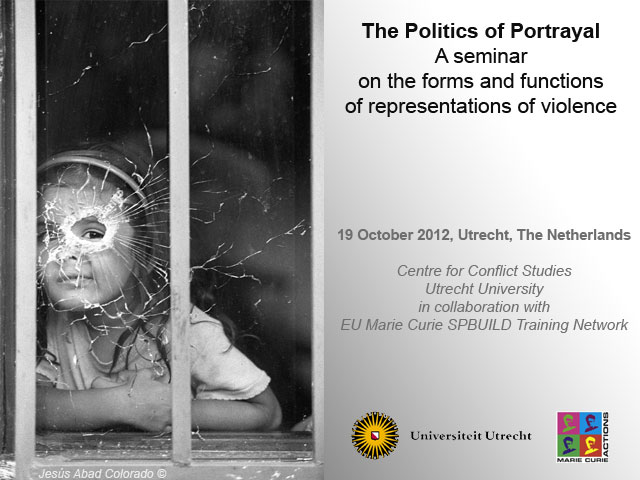International Seminar
The Politics of Portrayal: a seminar on the forms and functions of representations of violence
19 October 2012, Utrecht, The Netherlands
Centre for Conflict Studies, Utrecht University in collaboration with EU Marie Curie SPBUILD Training Network.
Organisers: Jolle Demmers (UU), Luuk Slooter (UU), Gabriel Ruiz Romero (Autonomous University of Madrid), Alexandra Abello-Colak (Bradford University) and Ariel Sánchez Meertens (INCORE, University of Ulster)
We invite theoretical and case study based papers from academics (both senior and PhD students) from inside and outside the SPBUILD network.
Please send in your abstract (200 words) before Monday 23 July 2012:
N.J.Witte@uu.nl
We have a limited budget for travel and accommodation.
The aim of this seminar is to gain insight into the historical and contemporary contest between parties for gaining control over the interpretation of violence, i.e., the portrayal of actors, motives, events, ideologies, and places in discourses on violence. The seminar examines – both empirically and conceptually – the ways in which images are constructed and framed, but also intends to gain insight in the functions of portrayal. Drawing on structurationism, we emphasize the need to examine the conditions of possibility for, and the constraints upon the politics of portrayal in particular cases. How do certain representations of violence contribute to (re)producing or contesting the established social order? Why and how are images contested and fought over? What is at stake for hegemonic and non hegemonic actors in these contestations?
We conjecture that the politics of portrayal fulfill at least three functions: (1) to recruit supporters for a state or non-state cause by propagating a discourse of othering and belonging;(2) to legitimize action in light of that cause; (3) to gain or continue to hold power over political, economic, juridical, and social measures that support the cause.
Methodologically, the social dynamics involved can be accounted for with the help of a multidisciplinary approach that combines elements from frame analysis, critical discourse analysis, and ethnographies of violence. More specifically, we would like to explore questions on discourse formation (how does a ‘hegemonic accord’ arise, how and why are people resistant or receptive to certain repertoires?); legitimization (how and why do audiences come to accept and support, or resist and oppose the course of action as proposed by protagonists as legitimate and justified?), and institutionalization (how does this contest translate into political and judicial measures and instruments, e.g. terrorist lists, neoliberal reforms, penal codes, decrees, resolutions, military interventions, detentions, as well as conventions and social rules)?
We recognize that the power to portray local incidents of violence, to position them in specific contexts of knowledge, has often been removed from the local societies in which they occur. From colonial racism, to the Cold War ideological stand-off, the War on Drugs and the War on Terror, different systems of “knowledge” have all produced “authorities” who define and interpret local incidents but also, and importantly, act upon these interpretations. The very tendency to place particular incidents of violence into a particular frame often involves reframing, which in turn may contribute to the distribution and persistence of those events in space and time. The portrayal of a bar room brawl as an ‘ethnic clash’, car-burnings in French suburbs as a ‘new intifada’, and sexual violence in the Democratic Republic of the Congo as ‘a weapon of war’ are all examples of how violent acts are increasingly framed in terms that are removed from – but certainly feed into -the local settings in which they occur. We are interested in these framing processes taking place in contexts of violence as well as on how local actors might contest and resist them. It is the dialectics of discourse, in which a variety of actors fight a discursive battle over image and self-image, the justification of violence, blame and accountability, which is at the core of the study of the politics of portrayal.
This workshop intends to address the above questions, by inviting a critical discussion supported by specific case studies and theoretical analyses from a range of study areas, disciplines, and practical experiences.
